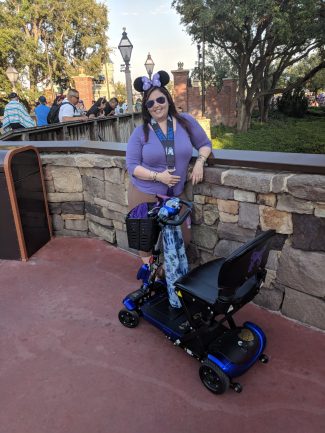Setting Boundaries Is Critical When Living With Chronic Illness
Written by |

I’ve never been very good with boundaries. I’ll respect yours, sure. But when it comes to setting my own and sticking to them, not so much. Over the years, this has taken its toll on relationships, employment, and even my health.

Kerry at Disney World with her mobility scooter in 2018. (Courtesy of Kerry Wong)
It could be as simple as respecting my privacy. I’ve lost count of how many times someone has seen my mobility aids and stopped to ask, “What’s wrong with you?” There is no reason a complete stranger should feel entitled to knowledge of my medical condition, but I still feel like I have to answer them honestly.
A more common boundary relates to personal contact. Some people are huggers, while others prefer only a handshake. Nowadays, even that can be too much. Just this afternoon, I was in a small elevator with my mom, and a woman with two maskless children approached. I panicked, but was barely able to get the words out: “I’m sorry, I just can’t have that many people in here with me.” I felt awful, but with sarcoidosis and compromised immunity, I couldn’t take the chance.
There’s an old saying that if you want to get something done, give it to a busy person. Back when I was still working (and even now, when I’m volunteering), I was always the busy person to whom others assigned tasks. I liked that, at first. I was proud that people believed I could handle anything. But soon, being the go-to person lost its appeal.
Rather than appreciation, my work generated the expectation that I could and would always do more. It didn’t matter that I came in early or stayed late, or that I worked on my days off. Even when I was on medical leave recovering from surgery, others still reached out with questions. And I still answered them.
Maybe it’s because I was raised to be a people pleaser. Maybe I simply wasn’t comfortable with confrontation. But that inability to say no drained me physically, mentally, and emotionally. When I gave all I could (and more) to the job, there wasn’t anything left for me to bring home. I couldn’t be as present as I should have been, or wanted to be, in personal relationships, and couldn’t give my body the rest it needed to recuperate.
For people living with chronic illness, it’s even more important to set those boundaries. But it’s also that much harder.
Many of us already put pressure on ourselves to try to keep up with our healthy friends, colleagues, and especially our past healthy selves. We don’t want to disappoint anyone, so we push ourselves to go further, do more, be better.
Pushing ourselves may work in the short term. The adrenaline rush can help us get through a busy weekend or a complicated project. But it doesn’t last, and the crash afterward can be severe. Far too many times I’ve pushed myself to get through a special event weekend, only to spend the next week, or longer, barely able to get out of bed.
When those of us with chronic illness struggle to meet others’ expectations, we must remind ourselves that our thoughts, feelings, wants, and needs matter, too. We matter, too. We have to learn to recognize our own limitations, which can be especially difficult because they can change from day to day.
This is where communication and self-advocacy are most important. We have to be clear about our boundaries and expectations. We have to let those around us know what we’re willing and able to do, and what is too much. We need to let people know if our condition, or any other factors, may keep us from meeting those expectations, and speak up if our needs change.
Perhaps the hardest part is respecting our own boundaries. Time and again, I’ve said that I couldn’t take on any more projects, only to take on the next project that arose. About 95% of the time, I still say yes when asked to do something. That’s not very good for me, but it makes the 5% that much more important. When I say no, I really mean it, and that needs to be respected.
I know this isn’t easy. I’ve spent many years and therapy sessions working on this, and it’s still a struggle. These days, when I recognize that I stood up for myself and held firm to an established boundary, I always think, “My therapist will be so proud of me.” And she is.
Boundaries are difficult, but possible — and they can be both life-affirming and lifesaving. It all starts with reminding ourselves that our needs matter, too.
***
Note: Sarcoidosis News is strictly a news and information website about the disease. It does not provide medical advice, diagnosis, or treatment. This content is not intended to be a substitute for professional medical advice, diagnosis, or treatment. Always seek the advice of your physician or other qualified health provider with any questions you may have regarding a medical condition. Never disregard professional medical advice or delay in seeking it because of something you have read on this website. The opinions expressed in this column are not those of Sarcoidosis News or its parent company, Bionews, and are intended to spark discussion about issues pertaining to sarcoidosis.







wendy a schleyer
I have never been asked what's wrong with me. I use a scooter when I go shopping and I use a cane to events. Never has anyone ever asked what is wrong with me. Setting boundaries is good in relationships of course but . wow this is horrible this girl went through this. im around people all the time doctors apst evry week . shopping family events never ever had this happen.
🦋 Kerry Wong
Aww, Wendy, I'm glad you've never been put in such an uncomfortable situation. Sadly, I think that's less common ... but surely something to be grateful for!
~🦋
Susan Owens-Delucchi
Kerry
So sorry that you feel so uncomfortable with people asking such personal health questions. For me, people don't see my ailments. So they don't think there's anything wrong or it's been cured. Family, friends, former coworkers have needed reminders that I have a new normal with a lot less energy. I have been working on setting boundaries and revising my expectations for what I will do with my time. I retired as an elementary teacher during covid and never intended to sit around the house in retirement, but I don't feel comfortable going out during this pandemic. My volunteer options with children haven't happened. So I've been working on self-care using online resources including two weekly live groups--meditation and women's writing group. And I feel very afraid of contact with people getting too close when I go to the doctor office or hospital for my infusions. I'm especially annoyed with people not covering the nose with the mask! Last Sat. at the hospital, I moved myself to a far corner of the waiting room away from a woman who kept fussing with taking her mask on and off. Thanks for the reminder about self-advocacy and setting boundaries for care of my disease and for my overall well-being. Susan
🦋 Kerry Wong
Thanks, Susan. It's not that I'm uncomfortable sharing (If I was, I couldn't really have this column😉), it's just so presumptuous for a random stranger to ask, you know?
I definitely understand how the invisibility of sarcoidosis can make it that much harder for those around us to understand, but that is surely more frustrating for us. Last year, my rabbi said he prefers to say we're "physically distancing" rather than social distancing, because we're still finding & creating ways to connect socially, virtually. Whatever we call it, it can be life saving during this time. We need to stay safe, but we still need each other. So those groups sound great!
🦋
KAREN E
Thank you for Kerry for sharing your thoughts. I have been experiencing a multitude of symptoms for over a year now. Sarcoidosis was found in the lymph nodes in my chest. After many many tests it was not found anywhere else and I was told that Sarcoidosis in the chest lymph nodes would not be causing all the symptoms I have. I am on Gabapentin and Azathioprine which has alleviated some symptoms but definitely not all. I am now being encouraged to get out and walk and try to start exercising. I agree that being out in the fresh air and walking is good for my mental health but many days I just don't have enough energy. My doctor said if I'm not a lot better by my next visit she is taking me off Azathioprine and won't put me on anything stronger because she won't treat when she doesn't know what she is treating. So, I just keep trying to pushing forward and put on a good front. Thanks for listening and Happy Holidays!
🦋 Kerry Wong
Oh, Karen, that catch-22 is a big one: we need to exercise to feel better but we can't exercise because of how bad we feel. It's one of those things that most people can't understand unless they are living it too. I'm sorry you seem to be at a stuck point with this doctor. My thought is that if this one isn't able to help you any more, it may be time to get a second opinion. Wishing you luck with that and happy & safe holiday season!
~🦋